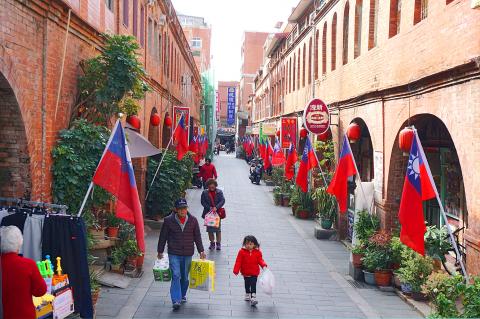A potter in Kinmen County yesterday said that he and a borough official removed People’s Republic of China (PRC) flags from a street where they have hung them for fear of contravening the Anti-infiltration Act (反滲透法).
Wang Ming-tsung (王明宗), who works in Jincheng Township (金城), said that Republic of China (ROC) and PRC flags have flown along Mofan Street since 2018, but passage of the act on Tuesday prompted the immediate removal of the Chinese flags.
Wang said that since 2003, he has been flying the PRC flag over his store, which popularized the sight of it in Kinmen.

Photo: CNA
In 2018, he and Dongmen Borough (東門) Warden Tsai Hsiang-kun (蔡祥坤) began lining the streets with both flags, Wang said.
“The idea was to create a ho spot to promote tourism,” Wang said.
They helped boost local tourism, which benefited the community, he said.
Flying PRC flags on either side of Mofan Street emphasized the difference between democracy and autocracy, Wang said.
The PRC flags were removed in October last year in observance of Double Ten National Day, but were restored in November, he said.
However, passage of the act — which aims to prevent meddling by external hostile forces, and ensure national security and social stability — might make flying the Chinese flag a problem, he said.
Many Taiwanese visitors were amazed at the PRC flags and said they would not be seen on Taiwan proper, he said.
“Like Taiwanese who are excited to see their national flag abroad, Chinese tourists also feel more welcome when they see their flag in Taiwan,” Wang said.
Kinmen’s tourism industry has suffered from a decline in Chinese visitors that began last year, he said.
Tsai said that the political atmosphere has changed, but they still have to abide by the law, apparently a reference to the act passed by the legislature on Tuesday.
Kinmen, a few kilometers off the Chinese coast, is a traditional stronghold of Chinese Nationalist Party (KMT), and County Commissioner Yang Cheng-wu (楊鎮浯) is a member of the party.
They would wait to see the results from the elections on Saturday next week before deciding whether to restart the flag tradition, Tsai said.
A Mofan Street store owner surnamed Hsu (許) said that it did not matter what flag was flying over her business, as long as she made money.
A visitor from Taiwan proper had accused her of being a sellout because she was flying the PRC flag, Hsu said.
It is “ridiculous that one could be accused of being a sellout because of a flag,” she said.
A clothing designer surnamed Hsu (許) said it was “out of place” to see PRC flags in Taiwan.
People should not treat the liberties that come with democracy so casually, the designer said, adding that if people truly sought to espouse the spirit of democracy, they should fly the ROC flag in China.

‘DENIAL DEFENSE’: The US would increase its military presence with uncrewed ships, and submarines, while boosting defense in the Indo-Pacific, a Pete Hegseth memo said The US is reorienting its military strategy to focus primarily on deterring a potential Chinese invasion of Taiwan, a memo signed by US Secretary of Defense Pete Hegseth showed. The memo also called on Taiwan to increase its defense spending. The document, known as the “Interim National Defense Strategic Guidance,” was distributed this month and detailed the national defense plans of US President Donald Trump’s administration, an article in the Washington Post said on Saturday. It outlines how the US can prepare for a potential war with China and defend itself from threats in the “near abroad,” including Greenland and the Panama

The High Prosecutors’ Office yesterday withdrew an appeal against the acquittal of a former bank manager 22 years after his death, marking Taiwan’s first instance of prosecutors rendering posthumous justice to a wrongfully convicted defendant. Chu Ching-en (諸慶恩) — formerly a manager at the Taipei branch of BNP Paribas — was in 1999 accused by Weng Mao-chung (翁茂鍾), then-president of Chia Her Industrial Co, of forging a request for a fixed deposit of US$10 million by I-Hwa Industrial Co, a subsidiary of Chia Her, which was used as collateral. Chu was ruled not guilty in the first trial, but was found guilty

A wild live dugong was found in Taiwan for the first time in 88 years, after it was accidentally caught by a fisher’s net on Tuesday in Yilan County’s Fenniaolin (粉鳥林). This is the first sighting of the species in Taiwan since 1937, having already been considered “extinct” in the country and considered as “vulnerable” by the International Union for Conservation of Nature. A fisher surnamed Chen (陳) went to Fenniaolin to collect the fish in his netting, but instead caught a 3m long, 500kg dugong. The fisher released the animal back into the wild, not realizing it was an endangered species at

DEADLOCK: As the commission is unable to forum a quorum to review license renewal applications, the channel operators are not at fault and can air past their license date The National Communications Commission (NCC) yesterday said that the Public Television Service (PTS) and 36 other television and radio broadcasters could continue airing, despite the commission’s inability to meet a quorum to review their license renewal applications. The licenses of PTS and the other channels are set to expire between this month and June. The National Communications Commission Organization Act (國家通訊傳播委員會組織法) stipulates that the commission must meet the mandated quorum of four to hold a valid meeting. The seven-member commission currently has only three commissioners. “We have informed the channel operators of the progress we have made in reviewing their license renewal applications, and